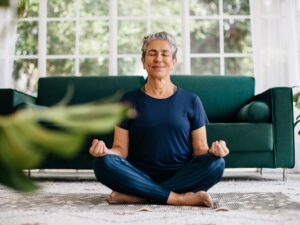Did you know 25 people are diagnosed daily with Parkinson’s disease? Even with these statistics, people still know very little about it. If pushed, they may remember that actor, Michael J Fox has it. According to Parkinson Canada, “Parkinson’s is a neurodegenerative disease. Movement is normally controlled by dopamine, a chemical that carries signals between the nerves in the brain. When cells that normally produce dopamine die, the symptoms of Parkinson’s appear.”
Parkinson’s is complex because no two people experience it in the same way. Often, it takes a family doctor who has been with the patient for a number of years to recognize what the changes are in the patient’s motor and non-motor symptoms. The next step is to see a neurologist, a movement disorder specialist and other specialists who can help with the diagnosis, but there is no single test or system and there is no cure for Parkinson’s.
Although Michael J. Fox was just 29 years old when he was diagnosed, most people think of Parkinson’s as something that afflicts senior citizens. It can affect people of all ages. In fact, according to Parkinson Canada, 20% of people who have Parkinson’s are below the age of 50.
Linda Bérard is one of that 20% – she was diagnosed at just 44 years old. Her life before her diagnosis was normal. She was enjoying her children and life with her husband. Since she had her children right away, she and her husband were at the point where they could enjoy a little freedom. They started traveling. She was at the top of her game career-wise working as a marketing analyst and strategist. The day of her diagnosis, her life changed forever. But she didn’t let the disease stop her from living.
Linda co-founded a non-profit organization / support group called “Entraidons-Nous” translating to “Let us help each other” in English, a partner of the Quebec Parkinson Network. Their mission is to support diagnosed people with Parkinson’s disease, and their care partners, who play a critical role in disease management and quality of life.
The grandmother of three is not only smart, and caring, she is also the latest subject of our #WomenInspiringWomen series.
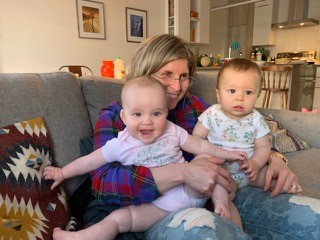
You were diagnosed at quite a young age with Parkinson’s Disease. How did you cope with the initial diagnosis?
First of all, I felt complete shock. You almost feel knocked out. Boxing is great exercise, but when you hear that you have Parkinson’s you feel knocked out. Like most people, I thought that Parkinson’s was just for seniors. I had some tremors, but not severe enough to lead me to think that it could be Parkinson’s. I thought that maybe I had been drinking too much coffee. Then the depression and isolation settles in. You really go into complete shock. I also didn’t know a lot about it.
Your daughters were teenagers when you were diagnosed. As a parent, you are not only a patient, but a mother worried about her children. How did you work through their challenges and stay focused on your own needs?
They were almost adults when I was diagnosed with Parkinson’s. When I was 16, my father was diagnosed with Multiple Sclerosis (MS). It hit him at the speed of lightening. He spent the last five years in a hospital bed. It really hit my family hard and took a toll on my mom. I saw the impact that it had on her and I clearly remember the impact that it had on me. I still tear up when I think about it 30 years later. I know that what’s happening is not my fault, but the guilt that I have to cope with is hard. I just tell my daughters to follow their dreams, whatever they are, and not to deprive themselves of anything in their lives on my behalf. That’s important to me.
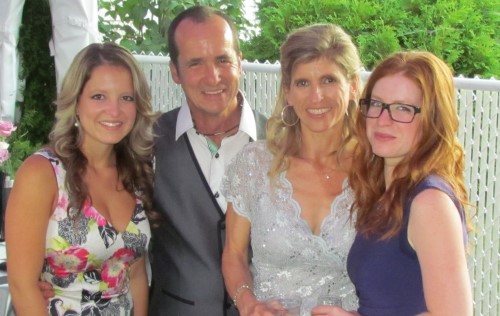
What type of support system do you have?
Medically speaking, from day one, my general practitioner encouraged me to go to the Montreal Neurological Institute. He was so right when he said that you will be in the best hands. In speaking with people that were in a similar situation, I’m so glad that I followed his advice. They ran a series of tests that led to my diagnosis. I think that Parkinson’s is a hypothesis. By process of elimination, it becomes the conclusion. The true diagnosis will come at your autopsy. That is the only time where there is a 100% diagnosis.
It sounds weird to say it, but I felt lucky because within two days of my diagnosis, I received a phone call from the Movement Disorder Programme from a nurse named Lucie Lachance. She’s probably one of the top nurses in the world in the field of Parkinson’s. She’s even been to China to give some training. She is part of the World Parkinson Coalition and she’s very renowned. I am privileged to be under her care. She took not only me, but my husband and family under her wing. Along with Dr. Edward Fon, my neurologist whose heading up the Canadian Open Parkinson Network, they have been taking care of me for the last seven years.
Dr. Fon launched the program in Quebec and because I am one of his patients, I was one of the first to enroll in the program. Other people with Parkinson’s are encouraged to register in the anonymous database. The Canadian program is based on what he did in Quebec with the QPN (Quebec Parkinson Network). I called them a few years back and said that I was ready to assign my brain for Parkinson’s research. At the time, they didn’t have an account with a brain bank, so they had to open one up so that I could enroll to leave my brain specifically for Parkinson’s research. They know my history from day one of my diagnosis, so it is good for them [for research purposes].
In addition to my doctors and nurses, a good kinesiologist who is a valued member of my health care team. Of course, my family is a major support system. My husband and children have been there for me 100% as well as some old and new friends.
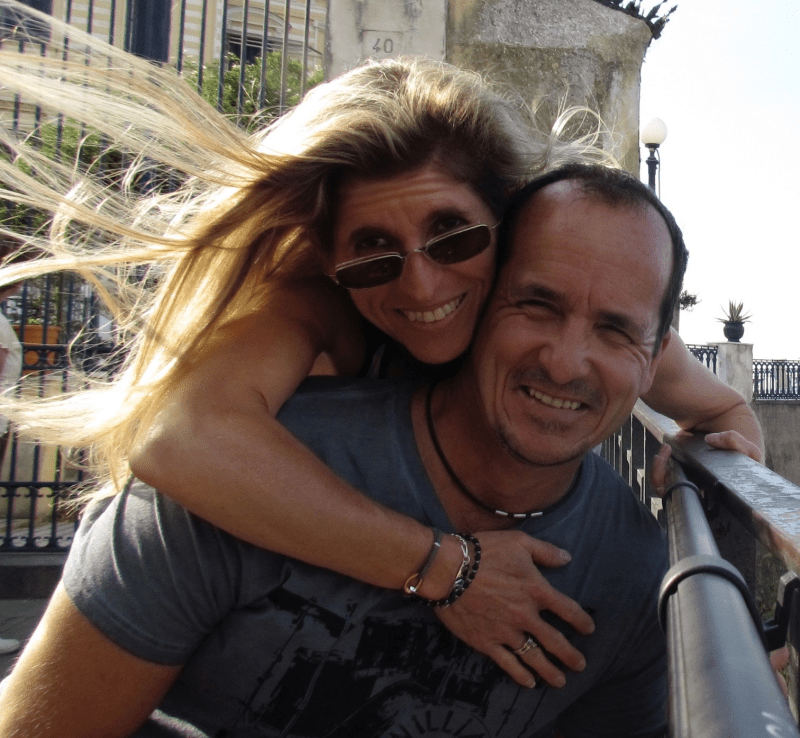
What is the best way, in your experience, to support someone who has been diagnosed with Parkinson’s any type of long-term illness?
First, they need to be very patient. I’ll be the first to admit, that these people are totally underrated. I often forget to be thankful. I went to a conference a few year’s back for caretakers. They showed the image of what to do on a plane in case of an emergency – where you put on the mask. The advice is to put on your mask first before putting on your child’s mask. The image was about how caretakers can’t always be at the mercy of the person that they take care of. They have to give themselves time as well, because a sick caretaker can’t be a caretaker. A friend of mine had her husband die a few months ago, and she was his caretaker for the last ten years. At one point, she had forgotten about herself, and he kept reminding her that she needed to take breaks. Thank God, because she was his support right until the end.
You chose to take part in clinical trials for treatment of Parkinson’s. Why did you make that decision?
My answer to that is why not? I figured if anything I can do will help; I should try. My hope is that this disease, one day, will be talked about in the past tense. I have a locket that I wear around my neck and there is a little message in there that says “I donated my brain to research.” I did it in the name of my children and my grandchildren. For me, if this is the last generation that needs to contend with Parkinson’s, then I’ll have done what I needed to do.
People with diseases are often given the added pressure of being made into heroes because of their condition. How do you manage these expectations on days when you aren’t feeling as positive?
I don’t understand this thing about being a hero. For me, a hero is somebody that goes beyond their capacity. I don’t. I show up and I am what I am. On those days when things are off, well that’s part of my reality. I’m not always comfortable meeting people when I’m feeling off, but if I really want to show the whole picture [of Parkinson’s] it’s part of what I have. When people ask, “How are you?”, we always answer fine – it’s the answer that we give instantly, without any thought. With Parkinson’s, I’m not always fine. If I want to show the reality behind the disease that’s haunting me, and taking 20 years off of my life, my answer is to always show it the way it really is.
You co-founded a non-profit organization / support group called “Entraidons-Nous” and are involved in the Quebec Parkinson Network. Why did you decide to not only be part of a group, but to begin helping people with Parkinson’s yourself?
The Quebec Parkinson Network is specifically for research. In terms of support groups, forty-four years old is young to be diagnosed with Parkinson’s. There are support groups out there, but the reality is when you find yourself in the room, you may be the youngest one there. The first support group that I ever went to, I went with my husband. There were 7 or 8 people in the room, and almost every person was older – that’s the reality. Even in the waiting room at the hospital, if I’m looking for someone my age, they are usually there to accompany their parents to their appointment.
The realities are not the same. Seniors have a lot to offer, and I’ve met and created some friendships with them. But, most of these people are retired or are about to be. They aren’t at the same point in their lives dealing with the disease. We didn’t have a lot in common and I felt even more isolated when I went to those support groups at first. Then I met some friends that were feeling the same and we started getting together and really having exchanges. I thought this was great, so why not share it with others?
In 2018, we went all across the province to meet more people. One of the members, who was diagnosed over ten years ago, rode his bicycle across the province for two weeks and did 2,200 kilometers. He actually crossed the country in 2016. It is really inspiring. Our goals are to place attention upon the disease and really shine a light on it because it still isn’t widely spoken about. We want to remind people that there are services out there that can help. I had friends that got the diagnosis and the doctor basically told them good luck – no more than that. I’m lucky that I have access to people like Lucie Lachance – I feel very privileged.
What impact has COVID had on you, in particular, but also, generally speaking, for people with Parkinson’s?
COVID and confinement has had a huge impact on people, but particularly people with Parkinson’s disease. In my case, I think I lost more in the last six months than in the first seven years. Parkinson’s is related to lack of dopamine and dopamine is one of those things that you need to be happy. Most people with Parkinson’s go through some type of depression. I fought the depression and forced myself to get out of the house and stop isolating myself.
With COVID, we had to go back to that. I understand why and I’m not questioning the decision. It obviously saved many lives. But it brought me back to dark times. It brought more stress, and I can’t say enough about stress. It’s the worst thing for Parkinson’s. Parkinson’s is degenerative, whatever you lose will not come back. I could go without medication for two days but the minute that I have stress, it’s absolutely the worst thing. It will take me from 100 to zero in two seconds.
How has your attitude towards the disease changed since you were diagnosed in 2013?
I don’t think it has changed, I’m still angry. I don’t think that I’ll ever accept it. I’ll come back to Lucie and she’s the one who told me that I was spending a lot of time and energy trying to accept the diagnosis, why don’t you just try to learn to live with it? Some people think it means the same thing. It doesn’t. When I understood that, and the difference is subtle, it took a lot of the weight off of my shoulders. Trying to accept it is something that I’m not longer focused on. I’m just trying to make the best out of it.
Your story and willingness to share it is inspiring. Who inspires you?
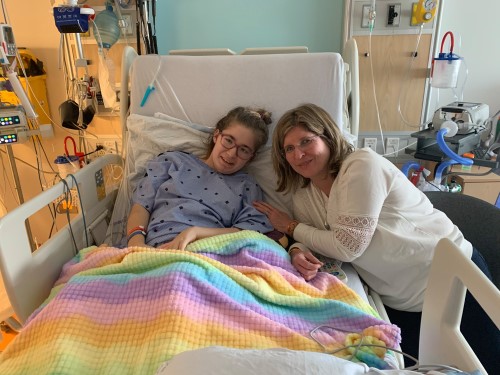
It’s funny when you hear how others answers this question. People will come up with a celebrity like a hockey player, a singer or a movie actor. We need to look closer than that. My family, for sure inspires me. Everyone around me inspires me. Ultimately, there is this one girl who I’ve known since she was born, Sandrine Korsos. Sandrine is going to be 18 in November and she was born with spina bifida. She has undergone 31 surgeries and is a real fighter. She could have given up so many times and her parents could have too.
Last Christmas, Sandrine came close to passing but she survived. This little girl was never supposed to walk, yet she walked until she was ten. She skated, swam in competitions and participated in horse-riding events. She can’t walk anymore but she plays luge hockey. She is learning her fourth language right now. She is making the most of what she does have and not focusing on that she doesn’t have. She is a huge inspiration for me, and I love her to death.
One of my daughter’s graduated from McGill nursing and when she was having difficult times, it’s a challenging course, she would remind herself about why she made that choice. It was because of this girl, and that kept her on track.


